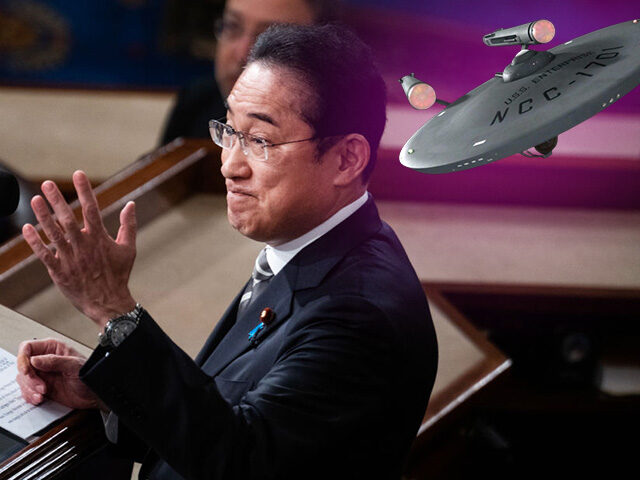President Joe Biden hosted visiting Japanese Prime Minister Kishida Fumio at a glitzy White House state dinner on Wednesday night, with a host of celebrities and business leaders in attendance.
Kishida was an engaging presence who seemed to charm his host and fellow guests much more than he impressed Japanese media, which credited him for some foreign policy accomplishments during his trip to Washington but doubted he could score enough public relations points to turn his gloomy polls around.
American media organizations fussed over the elaborate decorations, gourmet menu, and roster of celebrity guests — actor Robert DeNiro, singer Paul Simon, Apple CEO Tim Cook, former President Bill Clinton — and applauded Kishida for a witty toast in which he invoked Star Trek’s famous imperative to “boldly go where no one has gone before.”
The Bidens and Kishidas exchanged elaborate gifts and spoke of both their personal friendship and the enduring partnership between America and Japan. Kishida was slightly disappointed to have missed the blooming of Washington’s famous cherry trees by a few weeks, as they were a gift from Japan in 1912.
The Associated Press noted that not everyone was brimming with good cheer at the event:
But on a day when the inflation news from Washington was less than encouraging, Federal Reserve Chairman Jay Powell shot past reporters without stopping to chat. Olympic figure skater Kristi Yamaguchi, in a purple gown, said she didn’t expect to be out campaigning for Biden but nonetheless seemed bullish on his reelection. Actor Robert De Niro supplied the night’s Hollywood quotient and seemed to channel one of his tough-talking characters when he was asked for his thoughts about the 2024 election.
“What do you think?” he retorted.
The mood among Japanese media outlets was a bit sour as well. Kishida, like Biden, is floundering in the polls amid scandals and poor economic news and, while the press in Tokyo was willing to applaud Kishida for getting some important work done in Washington, it doubted he could turn his political fortunes around with one night of good press from a glamorous White House state dinner.
“No other politician has such a wide ‘perception gap’ in his home country and abroad than Fumio Kishida,” marveled the Japan Times, which noted that Kishida’s push for tighter “command and control” coordination with U.S. forces “in case of emergency” (i.e. China getting rowdy) is much less popular with Japanese voters than it might seem to American audiences.
“Even conservative politician Ichiro Matsui warned that Kishida shouldn’t turn Japan into an ‘unlimited ATM,’” the Japan Times noted.
Another Japan Times editorial saw Biden and Kishida as eager to lock in a long list of defense agreements before one of them leaves office, which might happen in the very near future:
From revamping the U.S. military’s command in Japan to U.S. ship maintenance and an expanded technological and defense-industrial collaboration, the list of new security initiatives is long — a reflection of what the two allies called the start of a “new era” as bilateral ties evolve from “alliance protection to alliance projection.”
The announcements, described as heralding a historic upgrade in defense relations, are underpinned by two main factors: Japan’s willingness to assume greater agency within the alliance — in Asia and beyond — and both governments’ desire to cement these initiatives ahead of November’s U.S. presidential election.
The aim is to institutionalize these measures as soon as possible to prevent potential backsliding under a possible return to power by former President Donald Trump, whose unpredictable foreign policy has left many world leaders on edge.
Analysts told the Japan Times that many of the agreements announced by Biden and Kishida seem designed to send China a message, but China will only find the message credible if financial and material commitments are made.
Japan could see major economic benefits from an upgraded defense industry with looser export controls, but that would cause trouble with opposition parties who remain committed to Japan’s pacifist postwar constitution and do not wish to see it become a major weapons exporter. Japan might also be unable to afford the investments necessary to become a full defense partner with the U.S. and its other Pacific allies, since it has a rapidly aging population, and its Self-Defense Forces are having trouble finding enough recruits.

COMMENTS
Please let us know if you're having issues with commenting.